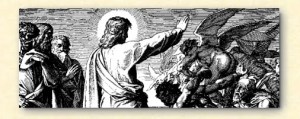And he went down to Capernaum, a city of Galillee. And he was teaching them on the Sabbath, and they were astonished at his teaching . . . Luke 4:31
Word is, there’s a new teacher down in the synagogue in Capernaum. He doesn’t seem to be a rabbi, at least not on the classic model (the argumentative type who sides with Hillel or Shammai, and can think of eighteen ways to call you a heretic if you don’t agree with them on every point). He doesn’t argue; he unfolds the scripture in a way no one has ever heard. Almost as if he wrote it himself! Talking it over among themselves, trying to describe what’s distinctive about his teaching, someone says, “I think . . . I think the best word is authority.”
That’s the best word, indeed; the teacher proves it when the demons barge in.
That morning
Oh yes, the word has spread even among unclean spirits, and they’ve been kicking up a ruckus lately. More demon activity than anyone has ever seen—what’s up? Word is getting out among them, that’s what. Satan himself has encountered the Man-not-like-any-other-man and has issued some warnings and dispatches. The local demons send a scout on a mission: check out this fellow. Obediently, the unclean spirit wrestles his hapless host from his keepers, marches him down to the synagogue and drops him onto a bench. There they—both demon and host—listen quietly for a few minutes. That voice, those words—the one inhabits the other and sends a shiver through the listening spirit. Or rather, a quake. It’s as if he, the possessor, is possessed, with confusion and a fear like he’s never known. He can’t help himself; he cries out in a voice that shakes the synagogue: “What is it between you and us, Jesus of Nazareth? Have you come to DESTOY us?!”
The moment seizes; the company freezes. It’s as if they recognize each other, the foul spirit and the teacher. The spirit, accustomed to casing the place everywhere he wanders, seeking souls to ruin, is now aware of nothing else but The Voice. The Voice answers him, reaching out to grab him by the throat, squeezing as the host squawks helplessly, like a chicken.
“Come out!”
The demon has no choice: he comes out, howling, throwing his host on the floor.
That afternoon
After that exciting morning, the teacher enters a house belonging to Simon the fisherman. (Imagine the muttering in the background from local rabbis and scribes: You’d think we could offer enlightening comments on the day’s events, or at least ask intelligent questions! Why does he accept the invitation of a workingman who only shows up at synagogue once a week and can’t wait to get out?)
Turns out, though, it’s not a good time. Sickness reigns, and Simon’s wife has interrupted meal preparations in order to attend to her mother, who was taken with a violent fever only hours ago. Jesus stands over the woman and rebukes the fever. Speaks to the fever, mind; you in the 21st century, take notice. A smackdown with a demon is one thing, but communicating with microbes is something else again. The fever departs; the lady’s eyes open and the first thing she sees is him. He smiles.
“Get up.”
The lady has no choice: she gets up, smiling back.
That evening
And word gets out, of course. By sundown Peter’s house is like a triage center because everyone within twenty miles has dragged their relatives or their aching, limping, festering selves to the house in Capernaum. Demons, too, both whether dragged or dragging. The word has spread among them like a plague. After dinner (served on the roof by an amazingly spritely grandma), the teacher comes down to the leveled ground outside Simon’s front door. It sounds like a barnyard, with all the groans and howls. It’s been a busy day, but he takes time. His hands reach out.
His hands . . . first here, first there, on leprous sores and misshapen bones and feverish wounds, they all feel his touch. And immediately they close up, straighten out, cool off. The sick feel his hands; the demons feel his voice as though they were all the way back in the garden with curses raining down on their snaky heads. One by one, they recognize him:
You are the Son of G–!
You are . . . !
You are the Son . . . !
One by one, he silences them. This is not the time, especially with the residents of Capernaum clamoring for him to stick around. Stay with us; be our teacher and healer! They want to define the mission for him. It’s ironic: his hometown kicked him out, his new town clutches him fiercely. Both are wrong.
For the original post in this series, go here.
Next>

